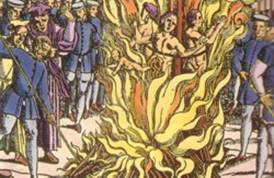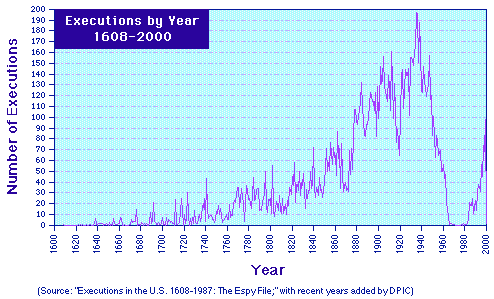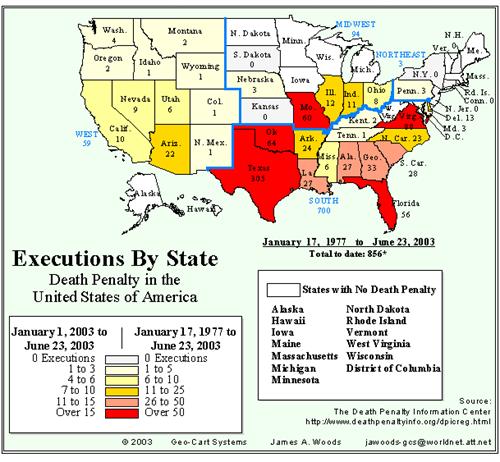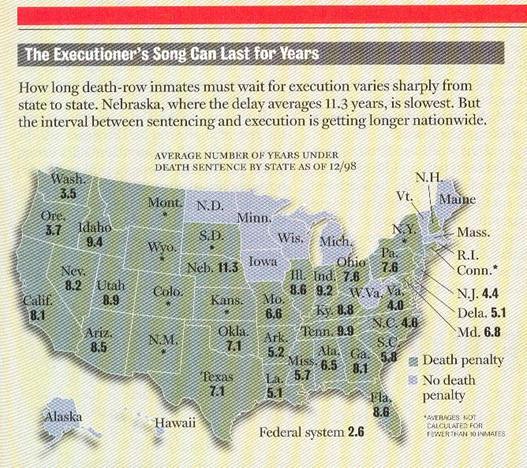Part 1: History and Methods of the Death Penalty
The following three videos will provide relevant information about the history of the death penalty. I have chosen three videos as each of them takes a different perspective on the issue. The first video, produced in the late ‘80s, provides a good history of executions in America . It also describes several arguments and statistics. Be aware that these statistics are from the late ‘80s and the rate of executions has increased dramatically since then. The second video, produced in the mid-‘90s, provides a look at the death penalty by examining famous cases from the ‘60s through the early ‘80s. This video is important to understand the Supreme Court's legal decisions regarding the death penalty. The third video, produced just a couple years ago, is an inside look at death row in Texas . The video is a series of interviews with death row inmates and prison guards. WARNING: Unlike the first two videos, this one is unedited and contains scenes and language not found on regular TV (it was only on HBO).
VIDEO: The “Death Penalty” video.
VIDEO: The A&E “Death Penalty” video.
VIDEO: Click here to watch “The Execution Machine.”
History of the Death Penalty (from colonies to 1977)
Early in the U.S. the death penalty was used as punishment for idolatry, witchcraft, blasphemy, rape, statutory rape, kidnapping, perjury in a capital crime trial, rebellion, murder, assault in  sudden anger, adultery, and sodomy. Later the crimes of arson, treason, and grand larceny were added. Since 1608 about 2% of all executions have been juveniles and another 2.5% were women (including all the witchcraft burnings). By 1900 there were concerns about the death penalty being cruel and unusual punishment. States developed the electric chair as a more humane execution. The last public execution was in 1936 in Kentucky . By the 1960s, states stopped using the death penalty. In 1972 the Supreme Court invalidates death penalty laws in Furman v. Georgia . The reason for the Supreme Court's decision was that when people were charged with death penalty offenses, the jury was only able to decide guilt or innocence. If the jury decided the person was guilty of the crime, the death sentence was automatic. This led to cases where juries agreed that the person was guilty but thought the circumstances did not warrant execution. Thus, the Court declared automatic death sentences were unconstitutional. By 1976 most states had altered death penalty laws such that once the jury declared a defendant guilty, there was an additional penalty phase in which juries were to decide if execution or life imprisonment was warranted. As such, in Gregg v. Georgia the Supreme Court re-authorized the death penalty so long as juries had control of the death sentence as well as guilt or innocence, thereby addressing the concerns of arbitrariness. In 1977, Gary Gilmore was executed in Utah by a firing squad. Currently, 38 states have the death penalty.
sudden anger, adultery, and sodomy. Later the crimes of arson, treason, and grand larceny were added. Since 1608 about 2% of all executions have been juveniles and another 2.5% were women (including all the witchcraft burnings). By 1900 there were concerns about the death penalty being cruel and unusual punishment. States developed the electric chair as a more humane execution. The last public execution was in 1936 in Kentucky . By the 1960s, states stopped using the death penalty. In 1972 the Supreme Court invalidates death penalty laws in Furman v. Georgia . The reason for the Supreme Court's decision was that when people were charged with death penalty offenses, the jury was only able to decide guilt or innocence. If the jury decided the person was guilty of the crime, the death sentence was automatic. This led to cases where juries agreed that the person was guilty but thought the circumstances did not warrant execution. Thus, the Court declared automatic death sentences were unconstitutional. By 1976 most states had altered death penalty laws such that once the jury declared a defendant guilty, there was an additional penalty phase in which juries were to decide if execution or life imprisonment was warranted. As such, in Gregg v. Georgia the Supreme Court re-authorized the death penalty so long as juries had control of the death sentence as well as guilt or innocence, thereby addressing the concerns of arbitrariness. In 1977, Gary Gilmore was executed in Utah by a firing squad. Currently, 38 states have the death penalty.
The following chart shows the rate of executions in America from colonial times until 2000. Notice the sharp drop in the late ‘60s and sharp increase since the ‘80s. The trend has continued upwards from 2000–2004.

Five Authorized Methods of Execution by Method (2003)
Method |
# of executions |
# of states authorizing method |
Jurisdictions that authorize |
Lethal Injection |
620 |
37 states + U.S. Military and U.S. Government |
Alabama, Arizona, Arkansas, California, Colorado, Connecticut, Delaware, Florida, Georgia, Idaho, Illinois, Indiana, Kansas, Kentucky, Louisiana, Maryland, Mississippi, Missouri, Montana, Nevada, New Hampshire, New Jersey, New Mexico, New York, North Carolina, Ohio, Oklahoma, Oregon, Pennsylvania, South Carolina, South Dakota, Tennessee, Texas, Utah, Virginia, Washington, Wyoming, U.S. Military, U.S. Government |
Electrocution |
150 |
10 states ( Nebraska is the only state that requires electrocution) |
Alabama, Arkansas, Florida, [Illinois], Kentucky, Nebraska, [Oklahoma], South Carolina, Tennessee, Virginia |
Gas Chamber |
11 |
5 states (all have lethal injection as an alternative method) |
Arizona , California , Maryland , Missouri , [ Wyoming ] |
Hanging |
3 |
3 states (all have lethal injection as an alternative method) |
Delaware , New Hampshire , Washington |
Firing Squad |
2 |
3 states (all have lethal injection as an alternative method) |
Idaho , [ Oklahoma ], Utah |
Number of Executions by State (last updated 7/23/03 )
Number of Executions by State (from 1976-July 23, 2003)
California : 10
New York : 0
North Carolina : 23
Florida : 56
Texas : 305
Virginia : 88
(Source: http://www.deathpenaltyinfo.org/dpicreg.html )
North Carolina
Category |
State Information |
State Abbreviation |
NC |
State Name |
North Carolina |
Death Penalty? |
Yes |
Age of Eligibility for Death Penalty |
17 |
Number of Executions Since 1976 |
36 |
Number of Executions before 1976 |
784 |
Current Death Row Population |
197 |
Number of Women |
4 |
Number of Juveniles |
5 |
Date Death Penalty Re-enacted |
06-01-1977 |
1st Execution After Re-enactment |
1984 |
Is Life Without Parole an Option? |
Yes |
Can a defendant get death for a felony in which s/he was not responsible for the murder? |
Yes |
Number of Innocent Persons Freed From Death Row |
5 |
Number of Clemencies Granted |
5 |
Region |
South |
Method |
Injection |
How is the Sentence Determined? |
Jury |
Location of Death Row(s) |
Raleigh |
Clemency Process |
Governor has sole authority to grant clemency |
(source http://www.deathpenaltyinfo.org/state/ Jan 2005)
How long do people spend on death row? (Newsweek 12/98)
Of course, this is the average; in actuality, some have spent over 20 years on death row and others as little as 8 months. (Both cases were in Texas ; one fought for his life, the other demanded he be executed immediately.)
The Death Penalty Internationally
World Execution Leaders in 1999 |
|
#1 China |
1,077 executions |
#2 Iran |
165 executions |
#3 Saudi Arabia |
103 executions |
#4 Congo |
100 executions |
#5 United States |
98 executions |
Note: Europe, Canada , Mexico , and even Russia have abolished the death penalty. Internationally, we are in the minority by having the death penalty, and we are the only major western power to still using the death penalty.
Now that we have a basic understanding of death penalty history in the U.S. and the philosophical grounding for the death penalty, we can explore the philosophical arguments against the death penalty.

